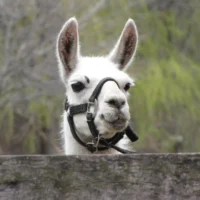Llamas have become very popular In the last few decades! Known for their gentle nature, llamas are not only very cute, they are also easy to care for and train. Their wool can be quite lucrative, and they require less space than horses or cows. No wonder these sweet and endearing creatures intrigue so many small farmers and homesteaders. However, while llamas are cute, they can have their less-than-adorable moments. In this article, a Hobe Sound, FL veterinarian delves into llama drama and provides valuable tips on how to prevent it.
What Exactly Is Berserk Llama Syndrome?
Berserk Llama Syndrome is a condition sometimes observed in camelids that have been raised by humans. (It’s worth noting that, though the word ‘Llama’ is in the name, alpacas are also susceptible to BLS.)
In essence, the term refers to aggressive or unfavorable behavior in llamas. It is more commonly observed in unneutered males, although occasionally females may exhibit similar behavior.
As you can probably imagine, handling an angry llama isn’t going to be the highlight of your day. Llamas generally do not bite, although it is not completely uncommon. However, they do scream, spit, kick, refuse to move, or even urinate and defecate all at once.
Are Llamas Fond of Being Petted?
Not so much. A llama may tolerate being petted by a human they are comfortable with, but they generally don’t enjoy being petted on the face or head, and they are not particularly fond of hugs. While llamas may accept these things, it doesn’t necessarily mean they see it as affection.
Are Llamas Berserk?
Generally, no. Despite being referred to as Berserk Llama Syndrome, this is simply typical llama behavior. It is typically a result of (often unintentional) mishandling and inadequate socialization. Llamas are generally calm and peaceful creatures, unless they perceive a threat.
What Is The Reason Behind Llamas Spitting?
Camelids rarely spit at humans, except when they are feeling angry or threatened. Typically, llamas primarily spit at one another. This is most often done to establish dominance within the herd. It’s somewhere in between being protective and defensive. Getting sprayed with llama spit is an unpleasant experience for both you and the llama.
How Can I Prevent BLS?
It is essential to handle llamas correctly right from birth. A common mistake many people make is being overly affectionate with baby llamas, also known as crias, by petting and cuddling them excessively. We understand they are incredibly adorable, and it can be difficult to resist pampering them.
That’s where the problem lies.
If you give a baby llama too much attention, it will begin to see you as one of its own, despite your unusual appearance. That sounds delightful, doesn’t it? Regrettably, this will lead to complications in the future, as your wooly companion will mistakenly perceive you as another member of the herd and treat you accordingly. That’s when the kicking, screaming, and spitting can become part of the equation.
According to certain llama experts, showing too much affection towards a cria can have very negative consequences. The concern is that this can lead to dangerous behavior. If a llama cannot be handled safely, it may be put down.
It’s important to mention that, as stated earlier, this is most commonly observed in intact males. It is generally recommended to have your studs gelded, unless, of course, you are interested in breeding.
Do I Need To Handle My Llamas?
There is a sweet spot between too much attention and not enough. It is crucial to be able to safely handle your llama in case they become sick or injured. You will need to familiarize them with being haltered, handled, having their feet touched, and going into catch pens or chutes. This goes beyond petiquette, even if your llamas are going to be treated as pets. It’s crucial for safety reasons, and also for the llama’s health and well-being.
If you have no prior experience with camelids, do lots of research. It’s worth your time to explore llama communication as well. For example, extended eye contact can trigger certain llamas. You’ll also want to get to know your llamas. Watch their body language, and listen to their vocalizations, which are typically humming sounds. Feel free to reach out to your Hobe Sound, FL vet for further details.
How Can You Properly Discipline A Llama?
Just like with other animals, it’s important to approach training with patience, consistency, and firmness. Some llamas respond well to a firm verbal reprimand, like a loud and stern ‘No!’ A gentle tap may be effective, but it’s important to remember to never strike an animal with force. Another option to consider is using a water gun. This is an interesting way of communicating with llamas, as it does somewhat mimic their behavior. Ask your vet for more information.
Do Llamas Feel Lonely?
Very much. Llamas are highly sociable creatures and thrive when they have a few companions by their side. Naturally, it is important to carefully select your pet’s companion. Unneutered males, for instance, can become quite territorial. That, of course, can definitely lead to llama drama.
Be sure not to overcrowd them on a small farm. Even though they don’t require much land, they do need room to walk around and graze! Ask your vet for specific llama care tips.
What Are Some Ways I Can Keep My Llamas Happy?
Simply ensuring proper care should suffice in most cases! Just like any other animal, that begins with having the right nutrition. Llamas thrive when provided with ample pasturage, although they can also consume grain or hay. Having a clean and comfortable barn or shelter, along with access to fresh water, is crucial. Of course, your llamas will also need regular visits from a veterinarian, and they will need to be sheared annually. Do plenty of research, and contact your Hobe Sound, FL vet for specific advice.
Do All Llamas Display Aggressive Behavior?
Absolutely not. One of the reasons for their growing popularity is because they are generally sweet and docile. Nevertheless, it is crucial for people that are thinking about llama ownership to be aware of the potential consequences that may arise from improper handling of these animals.
Are Llamas More Sociable Than Alpacas?
Generally, yes, though they are quite similar. Alpacas haven’t been domesticated for as long, and tend to have a slightly more reserved demeanor. However, each individual animal has its own unique characteristics.
If you are considering the two options, it’s worth noting that alpacas are smaller in size, yet equally adorable. Be sure to ask your vet for specific information.
Conclusion: Berserk Llama Syndrome is a term that describes the unruly behavior of unhappy or spoiled llamas. While rare, it is important for potential llama owners to know what it is and how to avoid it.
Schedule An Appointment At Our Hobe Sound, Fl Animal Clinic
Do you need any information or guidance regarding llama care? Are you in need of a top-notch veterinarian nearby? Feel free to contact us for any veterinary care your llamas may require. We are here to assist you, and as your Hobe Sound, FL pet hospital, we’re dedicated to offering great care.





